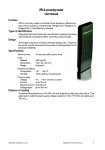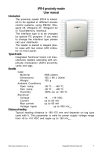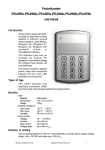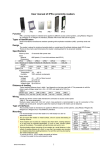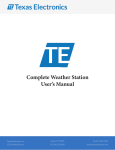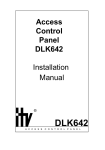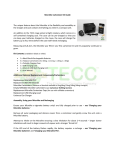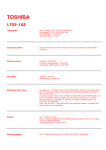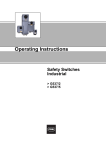Download User manual of U-Prox proximity readers
Transcript
User manual of U-Prox proximity readers U-Prox KeyPad U-Prox mini Function U-Prox proximity readers is intended to be applied in different access control systems, using RS232, Touch-memory, Wiegand 26, Wiegand 37 or Wiegand 42 interface. (Reader U-Prox KeyPad have built-in keypad). Types of identificators Integrated Technical Vision Ltd manufactures readers operating with amplitude (ASK) and frequency (FSK) modulation proximity cards and tags. Design The reader is placed in miniature hermetic plastic case. Thanks to the small overall dimensions the reader is distinguished for its advanced reliability. Specifications Warm-up time Case Material Dimensions 10 seconds after power start ABS plastic mm U-Prox KeyPad 120x65x17,5 gramm U-Prox KeyPad 240 U-Prox mini 80x45x13,5 Weight U-Prox mini 70 Ambient Conditions U-Prox mini U-Prox KeyPad -35 . . . +600С 0 . . . +55 0С 100% (without condensate) Temperature Humidity Power supply U-Prox mini U-Prox KeyPad Voltage +4.75. . . +16 V of direct current +9. . . +16 V of direct current Current up to 30 mA up to 40 mA Maximal current up to 60 mA up to 75 mA Voltage ripple up to 500 mV Distance of reading Typical reading distance show in table 1 and depends on tag type used with it. This parameter is valid for power supply voltage range from +9 to +16 VDC and ripple up to 150 mVp-p. Table. 1 Distance, mm 1 U-Prox mini U-Prox KeyPad 100-120 100-120 Wiring Table. 2 Reader has 8-wire colored cable intended for connection to access control panel. Table 2. The wires assignment: Multiwire signal cable with 0.22 mm2 wires' crosssectional is recommended to use for connection of the reader and control panel. Using this cable the maximum length of 100 (30 for W2/W3/W4/ WS Color Green White Red Black Brown Orange Blue Yellow Data 0 Data 1 +V GND Red Led Green Led Beep Hold/Synch RS232 Touch-Memory Function Rx Tx +V GND – – – Hold/Synch iButton +V GND Red Led Green Led Beep Hold/Synch Touch-Memory) meters can be obtained. Type of interfaces The proximity reader is intended to be applied in different access control systems, using RS232, Touch-memory, Wiegand 26, Wiegand 37, Wiegand 42. Mounting It is recommended to mount the reader on a wall closely to a door at appropriate height. ! Do not mount the reader on metal surface, since it causes decreasing of reading distance. ! If two readers are mounted at a distance less than 50sm, reading distance of a card may be reduced appreciably. In such a case, connect yellow wires of the readers. The readers will synchronize and work in turn. ! Synchronization allows mounting of two readers at a small distance, to the extent of reading distance of a card. In case that, two readers are mounted at a distance less than reading distance of a card the card may be read by the reader behind the wall. To mount the U-Pox KeyPad, U-Pox mini readers proceeds as follows: - Remove the boot in the bottom part of the reader with loosing the screw - Push mounting panel towards the screw and remove it from the reader - Using the mounting panel as a template mark and then drill two openings 6mm in diameter and 35mm deep - Pass the wire through central opening - Secure the mounting plate on a wall using plastic nailing plugs and screws - Connect the reader to the control panel's cable - Put on the reader on the mounting plate, push the case down against stop and secure the reader with the screw - Put on the boot 2 The Reader Operation Reading of identificator code The code reading is annunciated by built-in buzzer and two-color LED according to interface type and annunciation mode (refer to «Data transfer and Annunciation»). Repeated reading will be available after 0.8 sec if the identificator is moved away from the reader sensing area. Hold Mode Reader is turned to the hold mode while yellow wire is closed to the ground. In this mode reader does not read cards, thus current consumption decreases to 30mA. ! Do not apply voltage to hold outlet! Data transfer and Annunciation While reading card code the reader produces a short sound signal and switches green LED for a short time. This confirms that the card code has been read successfully, but is not related to the rights of the card within the system (E.g. right to enter) Green or Red Led and buzzer are used by controller to indicate the decision made by the system with respect to the presented card. To switch a green LED on valid card entry connect Brown wire( Red LED) And Orange wire ( Green LED ) together to negative LED output of the Controller. Wiegand Interface Engaging of LED and buzzer is possible automatically or by closing of corresponding wire to the black wire (GND) according to Table 3. х 00 01 02 03 04 05 06 07 08 Table 3. Annunciation mode: Red LED Gren LED Normally ON, switched OFF Blinks at reading at reading Outside control Normally ON, switched OFF Blinks at reading at reading Beep on card read Switched OFF Blinks at reading Outside control Switched OFF Blinks at reading Beep on card read Normally ON, switched OFF Outside control at reading Outside control Normally ON, switched OFF Outside control at reading Beep on card read Outside control Outside control Outside control Outside control Outside control Beep on card read. Normally ON, switched OFF Blinks at reading. Availability to switch ON at reading. Availability to Availability to switch from outside switch OFF from outside ON from outside Data transmissions from reader comply with the standard specified. Buzzer Beep on card read 3 RS232 interface Bit byte 0 byte 1 byte 2 To control annunciation send three-byte control packet to the reader. Packets should be transmitted with 2 400 bits per second, 8 bit data, no parity, 1 stop bit. Packet format: 7 6 5 4 3 2 1 0 0 1 0 0 1 0 0 1 red red blinks steady green green buzzer buzzer steady blinks pulsatory uninterruptedly 1 – corresponds to LED or buzzer switching on. LED blinking and buzzer pulsatory control bits have the highest priority. Annunciation does not change until next control packet is received. Reader transmits data as follows: byte # 0 1…10 11 12 Card read 23h data C sum 0D h PIN entered data: Bit Destination 21h data C sum 0D h 7 6 5 4 3 2 1 0 0 0 1 1 X X X X Checksum: exclusive OR of low nibbles of bytes from 1 to 10, high nibble of always must be 3h. Example: Card code 7E000460AA will be sent as: 23h, 37h, 3Eh, 30h, 30h, 30h, 34h, 36h, 30h, 3Ah, 3Ah, 3Bh, 0Dh. Limited Warranty Integrated Technical Vision Ltd warrants that for a period of 24months from the date of purchase, the product shall be free of defect in materials and workmanship under normal use and that in fulfillment of any breach of such warranty, Integrated Technical Vision Ltd. shall, at its option, repair or replace the defective equipment upon return of the equipment to its repair depot. This warranty applies only to defects in parts and workmanship and not damages incurred in shipping or handing, or damages due to causes beyond the control of Integrated Technical Vision Ltd such as lightning, excessive voltage, mechanical shock, water damage, or damage arising out of abuse, alteration or improper application of the equipment. The foregoing warranty shall apply only to the original buyer, and is and shall be lieu of any and all other warranties, whether expressed or implied and of all other obligations or liabilities on the part of Integrated Technical Vision Ltd. This warranty contains the entire warranty. Integrated Technical Vision Ltd neither assumes, nor authorizes any other person purporting to act on its behalf to modify or to change this warranty, nor to assume for it any warranty or liability concerning this product. In no event shall Integrated Technical Vision Ltd be liable for any direct, indirect or consequential damages. Loss of anticipated profits, loss of time or any other losses incurred by the buyer in connection with the purchase, installation or operation or failure of this product. 4




